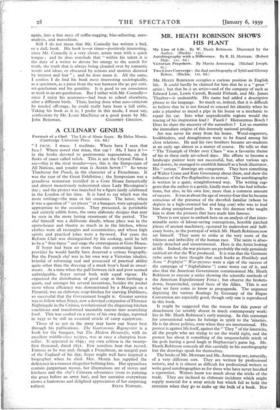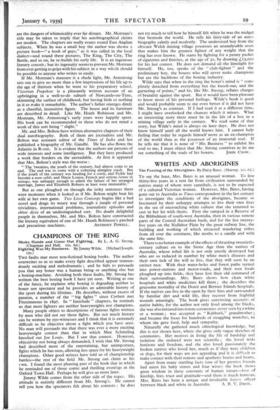MR. HEATH ROBINSON SHOWS HIS PLANT
My Line of Life. By W. Heath Robinson. Illustrated by the Author. (Blackie. 15s.) Autobiography with a Difference. By R. H. Mottram. (Robert Hale. 12s. 6d.) Victorian Peepshow. By Martin Armstrong. (Michael Joseph. 6s.) Two Lives Converge : the dual autobiography of Sybil and Glorney Bolton. (Blackie. 12s. 6d.)
MR. HEATH ROBINSON occupies a curious position in English life. It could hardly be claimed for him that he is a " great " artist ; but that he is an artist—and of the company of such as Edward Lear, Lewis Carroll, Ronald Firbank, and Mr. James Thurber—is undeniable. His name had added a descriptive phrase to the language. So much so, indeed, that it is difficult to believe that he is not forced to conceal his identity when he asks a plumber to mend a pipe in his house or a mechanic to repair his car. Into what unpredictable regions would. the tracing of his inspiration lead ? Fuseli ? Hieronymus Bosch ? Does he share the ancestry of the surrealists ? Let us examine the immediate origins of this intensely national prodigy.
Art was never far away from his home. Wood-engravers, bookbinders, and draughtsmen were to be found among his close relations. He and his two brothers became art-students at an early age almost as a matter of course. He tells us that " The Triumph of Order over Chaos " was a favourite theme of his in these early art-school days. His efforts to become a landscape painter were not successful, but, after various ups and downs, he managed to establish himself as a book illustrator. His " serious " drawings are competent. They have something of Walter Crane and Kate Greenaway about them, and show the influence of the Pre-Raphaelites in retreat. The autobiography is written in a quiet, straightforward way. The writing sug- gests that the author is a gentle, kindly man who has had tribula- tions, but also, in his own line, more than a common amount of success. It was at about the age of twenty-four that he became conscious of the presence of the dwarfish familiar (whom he depicts in a high-crowned hat and long coat) who was to lead him along unexplored paths. It was this daemon whO taught him to draw the pictures that have made him' famous.
There is not space to embark here on an analysis of that inter- minable series of labour-saving contraptions, horrible patched pieces of ancient machinery, operated by malevolent and half- crazy boors, to the portrayal of which Mr. Heath Robinson now set himself. They seem to strike at the very roots of the vileness and imbecility of the human race. The satire is_abso- lutely detached and unsentimental. Here is the Artistlooking at life. Indeed, the war pictures are probably the only genuinely satirical art that the War produced. It is true that the Germans (who seem to have thought that such books as Hunlikely and Some " Frightful" War-pictures were a sign of the success of the campaign of " frightfulness ") come worst out of it, and also that the American Government commissioned Mr. Heath Robinson to execute a series showing the scientific methods of the American Expeditionary Force ; but observe the broken- down, bespectacled, cynical faces of the Allies. This is not what we have come to know as propaganda. The sequence depicting the various floutings by Germany of the Hague
Convention are especially good, though only one is reproduced in this book.
It might be suggested that the reason for this power of detachment (so notably absent in much contemporary work) lies in Mr. Heath Robinson's early training. In this contempt for conventional values he belongs in spirit to the 'nineties. He is far above politics, even when they are international. His protest is against life itself, against the " They " of the limericks, all the people who are trying to set the world right, and the protest has about it something of the unquenchable mirth of the gods having a good laugh at Hephaestus's game leg. Mr. Heath Robinson conceals all this carefully in-his autobiography but the drawings speak for themselves.
The books of Mr. Mottram and Mr. Armstrong are, naturally, of a very different sort. They are written by professional writers, and it is almost as difficult for professional writers to write good autobiographies as for those who have never handled a typewriter. Writers know too much' about the tricks of the trade. They are inclined to elaborate incidents which might supply material for a stray article• but which fail to hold the attention when they go to make up the bulk of a book. Nor
are the dangers of whimsicality ever far distant. Mr. Mottram's title may be taken to imply that his autobiographical claims are modest. The chapters are really essays round East Anglian subjects. When he was a small boy the author was shown a picture book—" a book of gays," as it was called in the local dialect—and round these pictures, The King, The City, The Battle, and so on, he re-builds his early life. It is an ingenious literary conceit ; but its ingenuity seems to prevent Mr. Mottram from ever getting to grips with his subject in a way which should be possible to anyone who writes so easily.
If Mr. Mottram's measure is a shade light, Mr. Armstrong sets out to give no more than a few impressions of his life up to the age of thirteen when he went to his preparatory school. Victorian Peepshow is a pleasantly written account of an upbringing in a well-to-do suburb of Newcastle-on-Tyne, skimming the surface of childhood, but having little or nothing in it to make it remarkable. The author's father emerges dimly as a cheerful, insensitive figure. The house and its furniture are described in detail. Like Mr. Heath Robinson and Mr. Mottram, Mr. Armstrong's early years were happily spent.
His book can be recommended to those who do not mind a work of this sort being " slight."
Mr. and Mrs. Bolton have written alternative chapters of their dual autobiography. Both of them are journalists and Mr. Bolton was assistant editor of the Times of India and has published a biography of Mr. Gandhi. He has also flown the Atlantic in R-ioo. It is evident that the authors are persons of wide interests and some intelligence. But they have produced a work that borders on the unreadable. At first it appeared that Mrs. Bolton's style was the worse :
" The 'twenties, the youth of the century, had almost come to an end. The end was to come with a sickening almighty crash. But if the youth of the century was heading for a crash, and Pickle had become a mem sahib, and Marie Louise, French and serious femme de menage, was unhappy enough to admit the failure of her arranged marriage, James and Elizabeth Roberts at least were immutable."
But as one ploughed on through the jerky sentences there were moments when it looked as if Mr. Bolton might beat his wife at her own game. Two Lives Converge begins like a bad novel and drags its weary way through a jungle of personal trivialities, international problems, journalistic episodes and obiter dicta of an undistinguished sort. No doubt delightful people in themselves, Mr. and Mrs. Bolton have constructed the literary equivalent of one of Mr. Heath Robinson's patched











































 Previous page
Previous page